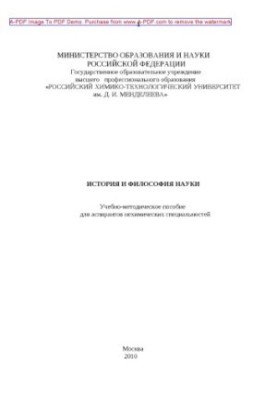History and philosophy of science Educational and methodical manual for graduate students of non-chemical specialties
 Instant download
Instant download
after payment (24/7)
 Wide range of formats
Wide range of formats
(for all gadgets)
 Full book
Full book
(including for Apple and Android)
History and Philosophy of Science . Training Manual for Non-Chemical Postgraduates" is a unique publication created by a team of authors, which is an important resource for graduate students and students seeking to better understand the nature of scientific knowledge and its development. This manual is not just educational material, but a real guiding star in the world of science, which will help readers understand complex issues related to both historical and philosophical aspects of scientific activity. The book deals with a wide range of topics, from the origin of scientific thought in antiquity to modern approaches to scientific knowledge. The author's team seeks to show how science was formed over the centuries, what philosophical concepts influenced its development and how these ideas continue to influence modern society. Readers will be able to learn about key figures in the history of science, such as Galileo Galilei, Isaac Newton and Albert Einstein, as well as how their discoveries have changed our understanding of the world. This guide will be especially useful for graduate students and students of non-chemical specialties who want to expand their horizons and understand how scientific ideas intersect with other disciplines. The book will be of interest not only to those who study the philosophy of science, but also to those who want to understand how scientific concepts affect technology, society and culture. It will become an indispensable tool for those who strive for an interdisciplinary approach in their scientific activities. The topics raised in the book cover important aspects such as the methodology of scientific research, the role of experiment and theory in science, and ethical issues related to scientific practice. Particular attention is paid to critical thinking and the ability to analyze scientific arguments, which is an integral part of the training of a modern scientist. The book emphasizes the importance of philosophical understanding of scientific discoveries and their consequences for humanity, which makes it relevant and necessary in the conditions of rapid scientific and technological progress. The style of the authors is characterized by accessibility and clarity of presentation, which makes complex concepts understandable even for those who are just starting their way into science. The book is filled with examples, illustrations and questions for self-examination, which contributes to a deeper assimilation of the material. It can serve as a basis for discussions at seminars and conferences, as well as a source of inspiration for future research. If you are looking for books on the philosophy of science, the history of science or the methodology of scientific research, this guide will be a real find for you. It will also be useful to those who are interested in interdisciplinary approaches and want to understand how different areas of knowledge are interconnected. Readers interested in questions about how science shapes our understanding of the world will find many interesting ideas and concepts in this guide. History and Philosophy of Science . Tutorial for graduate students of non-chemical specialties” is not just a textbook, but a real encyclopedia of knowledge that will help you not only become better in your field, but also expand the horizons of your thinking. Do not miss the opportunity to immerse yourself in the world of science and philosophy, which will open up new prospects and opportunities for development.
LF/151357660/R
Data sheet
- Name of the Author
- Collective of authors
- Language
- Russian



























